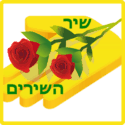
Parashat Chol HaMoed Pesach: Reading Song of Songs
Moadim l’Simchah (Happy Festival!), dear friends. I hope your Passover has been sweet and meaningful so far.
This Shabbat, we read a special portion for the middle days of Pesach (“Chol HaMoed Pesach“). It is found in Exodus 33:12 – 34:26 & Numbers 28:19 – 28:25.
Also, it is traditional during Pesach to read from Megillat Shir HaShirim – the book of Song of Songs. Song of Songs is a beautiful text filled with erotic love poetry between two young lovers. Like the Book of Esther, there is some degree of controversy with regards to its inclusion in the Hebrew Bible. Is a book of love poetry really sacred? Jewish tradition teaches that the book is one big metaphor for the love between God and the people of Israel. Others see a link between the themes of young love and the springtime festival of Pesach. Rabbi Akiva, famously, called Shir HaShirim “the holiest book of all.” (Mishnah Yadayim 3:5)
Judaism has never really shied away from themes of sexuality and love, yet our tradition is quick to turn to interpretations rather than the plain meaning of the text. Perhaps the best reading would be a mixture of the carnal and the spiritual levels, equally.
Both Rashi and Rabbi Akiva believed that the love between two people reflects the loving relationship between an individual and God. Rabbi Benjamin Scolnic writes,
“Why select such a questionable book for the canon while excluding other, less doubtful books? The rabbis were horrified by fertility cults, idolatrous rites, sacred marriage and prostitution. How could those who condemned the representation of God by any image speak about God in such sexual terms? Would it not have been better to stay away from a book that, when allegorized, portrays a love between God and the people which seems so close to the love portrayed by pagan myths and rituals? A key distinction between the Israelite and pagan portrayals of Divine love is that no pagan culture spoke of a god as a husband or a lover of his people. Israelite religion, in its radical monotheism, demanded the people’s absolute fidelity to the One God. In human terms, there was only one relationship that reflected that kind of fidelity and that was a woman’s vow of loyalty to her husband.”
As you might imagine, Jewish mystical traditions embraced this analogy. Merkavah (chariot) mysticism (which took its name from the chariot seen by Ezekiel in his vision), viewed Israel as the bride and God as the groom. Later theologians took this marriage image and linked it to the individual relationship which each of us might cultivate with God. Martin Buber, in his I-Thou relationship, exemplifies this beautifully.
Together, this Shabbat, we will read some of these romantic verses, and ponder the relationship being encouraged on multiple levels. Happy Passover and Shabbat Shalom!





